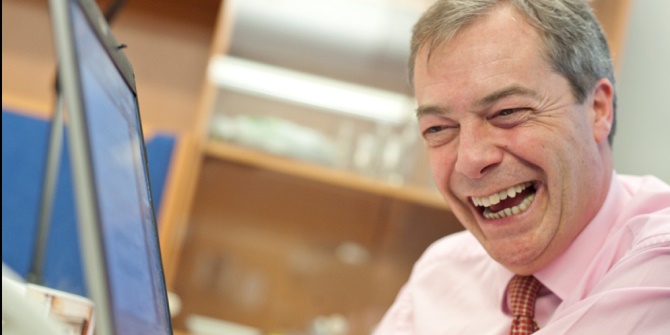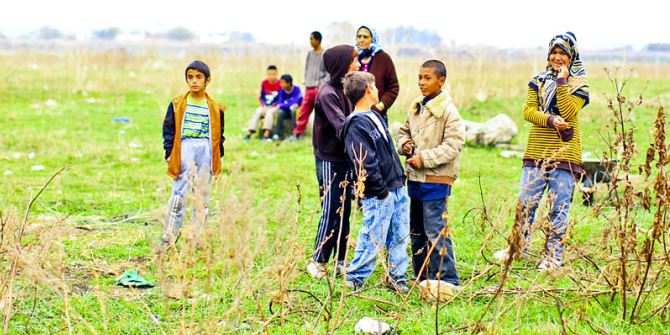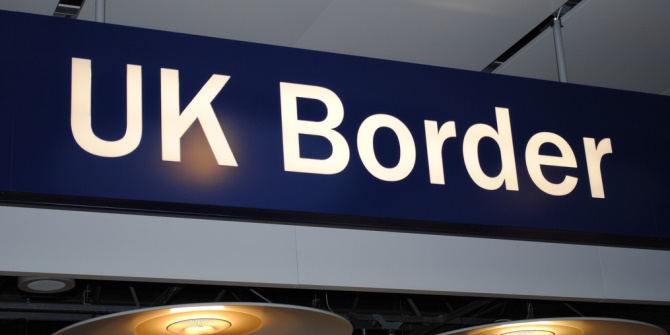Northern Ireland has undergone significant demographic shifts in recent years, but a closer inspection of population data reveals many new Catholics in Northern Ireland are actually migrants. In the context of a political impasse, Albert Ward explores whether this may prove decisive for the future of Northern Ireland.
For over a year now, Northern Ireland has been without a government. The situation mirrors an earlier period from 2017, when Northern Ireland went three years without ministers. Republicans appear ascendant, after winning most seats in the 2022 Stormont elections. This seems driven by a huge demographic shift: in the 2021 census, Catholics became the largest group in Northern Ireland for the first time in history. But what does this really mean? And what implications might it have for politics on the island? While much of the discussion around it has assumed that both groups are relatively homogeneous, a significant portion of new Catholics were, in fact, not born in Northern Ireland.
This demographic transformation was expected; the growth in the population of those who are either practising or culturally Catholic has been occurring gradually over several decades, as shown by census data: in 2001, 40 per cent of the population identified as Catholic or were raised as such, while 56 per cent identified or were raised as Protestant or other Christian denominations. In 2011, this was 45 per cent and 48 per cent, respectively. By the 2021 census, 46 per cent were Catholic, and 44 per cent Protestant or other.
The migration factor
This is a great reversal. Yet, birth rates for native Catholics and Protestants alone cannot explain it. Birth rates for Catholic women were not much higher than Protestant women in the early 2000s. Were the size of each group to grow only according to this small difference, we would not expect the Catholic and Catholic-identifying population to grow so fast, from 678,000 in 2001, to 805,000 in 2021. It is similarly unlikely that either native group would have experienced a significant change in fertility rates in the intervening 20 years.
What, then, can explain why Catholics have overtaken Protestants in such a relatively short space of time? We can probably attribute a lot to immigration. Northern Ireland has, since 2004, experienced significant European migration, particularly from the Visegrád Four: Poland, Hungary, Czechia and Slovakia. With the exception of Czechia, these are all predominantly or overwhelmingly Catholic countries. In the 2001 census, 2 per cent of Northern Ireland’s population was born outside of the British Isles. By 2021, this had grown to 7 per cent, half of which came from EU countries (excluding the Republic of Ireland), primarily the Visegrád Four. This is, of course, a similar story to the rest of the UK, but in a place as small and as marked by confessional divides as Northern Ireland, it is far more significant.
Northern Ireland has, since 2004, experienced significant European migration, particularly from the Visegrád Four: Poland, Hungary, Czechia and Slovakia. With the exception of Czechia, these are all predominantly or overwhelmingly Catholic countries.
Data on the religion of migrants also confirms this story. What differentiates Northern Ireland from the rest of the UK here is that migrants are far more likely to be Christian. Where once these were mostly Protestant, now they are overwhelmingly Catholic. In the 2001 census, 42 per cent of all those born outside Northern Ireland were Catholic or Catholic-identifying, compared to 47 per cent Protestant and other Christian. By 2011 – the data is not yet available for the 2021 census – this difference had flipped and widened dramatically: 48 per cent of those born outside Northern Ireland were Catholic, compared to 34 per cent Protestant and other Christian.
Existing studies suggest that fertility differences between Catholics and Protestants in Northern Ireland are mostly related to doctrinal differences in attitudes towards children and contraception, rather than socialisation. As religious belief declines, we would expect this gap to shrink further. For migrants who practise either faith, we might expect this gap to shrink more slowly, given that practising migrants typically have more strongly-held religious beliefs than natives.
A game-changer for Irish unity?
In Northern Ireland’s increasingly uncertain political climate, what might this all mean? Most importantly, what do these new citizens think? There is no clear evidence. On the most significant political question in Northern Ireland – unification – we would not expect them to hold as strong views as native Catholics, who are themselves not wholly in support of reunification. A poll conducted by LucidTalk in 2020 found 43 per cent of natives would support Irish unity in a potential referendum, while only 19 per cent of those born outside the British Isles were in favour. Such low levels of support do not necessarily indicate opposition, rather apathy, and probably non-participation in any future referendum.
They may not remain apathetic, however. Catholic migrants are more likely to attend church than native Catholics. While the case for Irish unity is less and less made as a religious one, we might still expect some political socialisation on this issue to happen in church, where these new citizens may be encouraged to feel common cause with the more Catholic Republic. Sinn Féin’s political rise in the Northern Irish Assembly could indicate an ascendant Catholic political identity, driven in part by these demographic changes. But this is also far from clear: the party’s platform north and south of the border, while containing commitments to Irish unity, focuses mostly on left-wing economic policies.
The continued dysfunction of the Stormont government, stymied by unionists, might push these apathetic Catholic voters towards political engagement. The disruptions of Brexit could too. It’s no shock that Brexit is already perceived negatively by European migrants to the UK. Among Catholic migrants, perceptions of it as a Unionist project will only accentuate this.
Whatever the role of migrants in Northern Ireland’s politics, we should avoid making such sweeping generalisations about the political views of Catholics and Protestants there. The difference in size between these two populations is still relatively small; native-born Catholics and Protestants are, of course, themselves not homogeneous. Northern Ireland is now more diverse than it has ever been, and becoming increasingly hard to categorise in such binary terms. Given this diversity, however, and given the slimness of demographic margins, it is likely that migrants will play an important role in its future.
All articles posted on this blog give the views of the author(s), and not the position of LSE British Politics and Policy, nor of the London School of Economics and Political Science.
Image credit: Photo by Gred Clarke, CC BY 2.0 Deed | Attribution 2.0 Generic | Creative Commons







